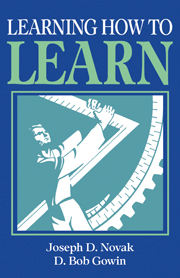Book contents
- Frontmatter
- Contents
- Foreword
- Preface
- Acknowledgments
- 1 Learning about learning
- 2 Concept mapping for meaningful learning
- 3 The Vee heuristic for understanding knowledge and knowledge production
- 4 New strategies for instructional planning
- 5 New strategies for evaluation: concept mapping
- 6 The use of the Vee for evaluation
- 7 The interview as an evaluation tool
- 8 Improving educational research
- Appendixes
- References
- Index
8 - Improving educational research
Published online by Cambridge University Press: 05 June 2012
- Frontmatter
- Contents
- Foreword
- Preface
- Acknowledgments
- 1 Learning about learning
- 2 Concept mapping for meaningful learning
- 3 The Vee heuristic for understanding knowledge and knowledge production
- 4 New strategies for instructional planning
- 5 New strategies for evaluation: concept mapping
- 6 The use of the Vee for evaluation
- 7 The interview as an evaluation tool
- 8 Improving educational research
- Appendixes
- References
- Index
Summary
Educational research, like research in any field, is an attempt to create new knowledge. Not all research succeeds in producing knowledge claims that contribute to increasing human understanding, and educational research has been notoriously unproductive in this respect. We believe that many of the past failures of educational research, as well as research in other social sciences, are due partly to the artifactual nature of educational events or objects, which are not naturally occurring but rather produced by people. Naturally occurring events, not being subject to the vagaries of human individuality, are much more consistent and predictable. It is not surprising that more progress has been made in astronomy, physics, chemistry, biology, and geology than in sociology or education. The historical sequence of disciplinary advances corresponds roughly to the regularity of the naturally occurring events or objects being studied and how easily they can be observed. Photosynthesis and continental movements are both very regular events, but it has taken decades to develop the concepts and methods to observe them. All disciplines are also dependent upon the concepts humans invent to be able to see regularities, even in naturally occurring phenomena.
In Chapter 1 we indicated that we will not dwell on the issue of whether or not education is a science. Learning and the construction of knowledge are both naturally occurring phenomena, and at least some aspects of education have natural regularity (some of its aspects, such as school organization, have at times a distressing stability as well).
- Type
- Chapter
- Information
- Learning How to Learn , pp. 149 - 174Publisher: Cambridge University PressPrint publication year: 1984



